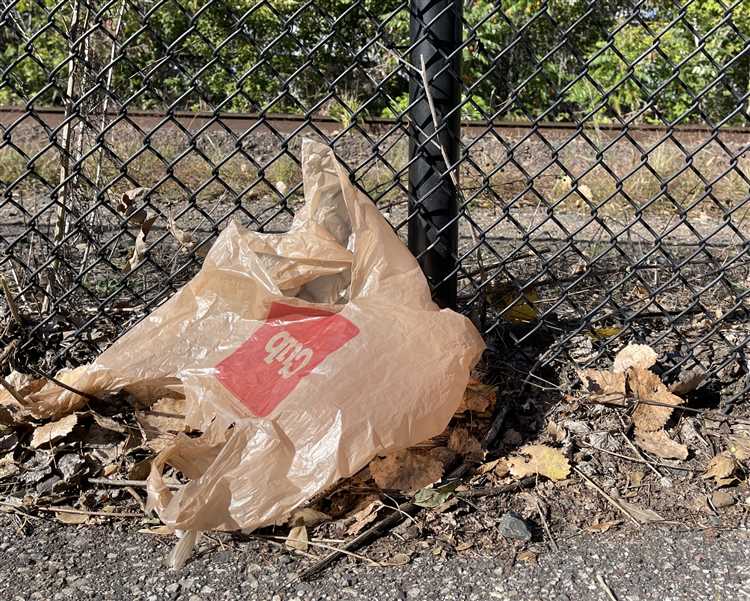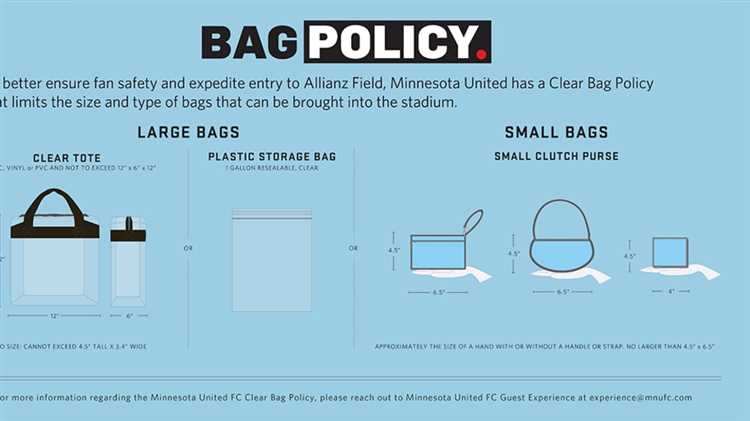
When it comes to bag policies, it’s always good to be informed before heading out for a day of shopping or running errands. The state of Minnesota has specific rules in place regarding bag usage and fees, and it’s important to understand what those policies are.
In recent years, many cities and states have been implementing regulations to reduce the use of single-use plastic bags in an effort to promote sustainability and environmental consciousness. Minnesota is no exception, and several cities within the state have implemented their own bag policies.
In general, most cities in Minnesota have transitioned to bag policies that require customers to pay a fee for each disposable bag they use at certain types of stores, such as grocery stores or supermarkets. These fees generally range from 5 to 10 cents per bag and are intended to encourage consumers to bring their own reusable bags.
However, it’s important to note that not all cities in Minnesota have implemented bag fees. Some cities have chosen not to regulate bag usage or have opted for other approaches, such as education campaigns or voluntary efforts to reduce plastic bag consumption.
In conclusion, if you are planning a shopping trip in Minnesota, it’s best to come prepared with your own reusable bags. While some cities may still provide plastic bags free of charge, many have implemented bag policies that encourage the use of reusable bags and may require customers to pay a small fee for each disposable bag used. Being aware of these policies will not only help you save money but also contribute to a more sustainable future.
- Understanding Bag Policies in Minnesota
- Bag Policies: What You Need to Know
- Free Bags: Myth or Reality?
- Paying for Bags: What to Expect
- Types of Bags and Fees
- Exceptions and Exemptions
- Environmental Impact of Bag Policies
- Alternatives to Single-Use Plastic Bags
- 1. Reusable Bags
- 2. Paper Bags
- 3. Bring Your Own Container
Understanding Bag Policies in Minnesota
Bag policies in Minnesota can vary depending on where you are shopping. It’s important to understand the different rules and regulations so you can be prepared when visiting stores in the state.
Some stores in Minnesota have implemented a bag fee or a ban on single-use plastic bags. This means that if you forget to bring your own reusable bags, you may be charged a small fee for each plastic bag you use or you may not be offered a bag at all. These policies are often put in place to encourage shoppers to use more sustainable alternatives and reduce waste.
Other stores in Minnesota may still provide plastic bags for free, but they may also offer incentives for using reusable bags. For example, some stores may offer discounts or rewards for bringing your own bags. This is a great way to encourage shoppers to be more environmentally conscious and make the switch to reusable bags.
It’s worth noting that bag policies can also vary by city in Minnesota. Some cities have their own specific regulations, such as requiring stores to charge a fee for plastic bags or banning them altogether. It’s important to familiarize yourself with the bag policies in your specific city if you’re unsure.
Overall, understanding bag policies in Minnesota is essential for being a responsible and informed shopper. By bringing your own reusable bags and being aware of any fees or bans in place, you can contribute to reducing plastic waste and promoting sustainability in the state.
Key takeaways:
- Bag policies in Minnesota vary by store and city.
- Some stores charge a fee for plastic bags or ban them altogether to encourage the use of reusable bags.
- Other stores may offer incentives for bringing your own bags, such as discounts or rewards.
- City regulations can also affect bag policies in Minnesota.
- Being aware of bag policies and using reusable bags can help reduce plastic waste and promote sustainability.
Bag Policies: What You Need to Know
When it comes to bag policies in Minnesota, there are a few important things to keep in mind. Whether you are shopping at a grocery store or visiting a retail store, it’s good to be aware of the regulations regarding bags.
In Minnesota, there is no statewide ban or fee on plastic bags. This means that stores are generally allowed to provide them to customers free of charge. However, some individual cities in Minnesota have implemented their own bag policies. For example, in Minneapolis, a city-wide ban on plastic bags went into effect in 2020.
Even though there may not be a statewide ban, many stores in Minnesota have chosen to voluntarily reduce the use of plastic bags. Some stores offer reusable bags for purchase, while others may provide paper bags as an alternative. Additionally, many stores offer discounts or incentives to customers who bring their own bags.
It’s also worth noting that some stores may have bag policies specific to certain items. For example, stores that sell alcohol may require customers to use plastic bags for these purchases. This is to ensure that any potential leaks are contained and do not damage other items.
Overall, it’s always a good idea to be prepared and bring your own bags when shopping in Minnesota. Not only does this help reduce plastic waste, but it can also save you money if stores offer bag incentives or discounts. By being aware of the bag policies in your area, you can make more informed choices and contribute to a cleaner environment.
Free Bags: Myth or Reality?
One of the biggest misconceptions about bag policies in Minnesota is the belief that bags are always provided for free. While it is true that many stores and retailers do offer complimentary bags, this is not always the case.
Some stores charge a small fee for each bag used, while others may offer a limited number of free bags before charging extra for additional ones. This policy is often implemented as a way to encourage customers to bring their own reusable bags and reduce plastic waste.
However, it is important to note that not all stores have bag fees or restrictions. Many businesses still provide free bags as a courtesy to their customers. It is always a good idea to check with the specific store or retailer to determine their bag policy before assuming that bags will be provided for free.
If you do prefer to use your own bags, there are often incentives offered by stores for doing so. Some businesses may offer discounts or rewards for bringing reusable bags, which can help offset the cost of purchasing them.
In conclusion, while there are instances where bags are provided for free, it is not a guarantee. Bag policies vary among stores and retailers in Minnesota, and it is best to be aware of each individual policy before making any assumptions. By being informed and making conscious choices, we can all contribute to a more sustainable future.
Paying for Bags: What to Expect
When it comes to bag policies in Minnesota, many retailers are adopting a pay-for-bags approach as a means to reduce waste and encourage customers to bring their own reusable bags. While some stores still provide complimentary bags, it is becoming increasingly common for customers to have to pay for bags.
Types of Bags and Fees

The type of bag you use can determine the associated fee. Plastic bags, which are known for their negative environmental impact, often have a higher fee compared to paper bags or reusable bags. Some stores may even offer a discount or incentive for customers who bring their own bags.
Keep in mind that bag fees can vary between retailers, so it’s essential to be aware of the specific policies of the store you are shopping at. Look for signage or ask the cashier about the bag fees before making your purchase.
Exceptions and Exemptions
There are typically exceptions and exemptions to bag fees in Minnesota. For example, some retailers may not charge a fee for bags used to package bulk items, perishable goods, or prescription medications. Additionally, certain customers, such as those participating in assistance programs, may be exempt from bag fees.
If you have specific needs or circumstances that may qualify you for an exemption from bag fees, don’t hesitate to inform the cashier or store staff. They will be able to provide you with the necessary information and guidance.
Note: The information provided here is based on general bag policies in Minnesota and may not apply to all stores or locations. It’s always recommended to check with the individual retailer for their specific bag policies.
Environmental Impact of Bag Policies
Bag policies in Minnesota, whether they are free or require payment, have a significant impact on the environment. Plastic bags, which are commonly given out for free, have been a major source of pollution in our communities.
Plastic bags are not biodegradable and can take hundreds of years to break down. When they end up in landfills, they release toxins into the soil and water, contaminating the surrounding environment. These toxins can harm wildlife and have harmful effects on ecosystems.
Furthermore, plastic bags pose a threat to marine life. When they are not disposed of properly, they can end up in rivers and oceans, where marine animals mistake them for food. This can lead to ingestion and entanglement, both of which can be fatal.
By implementing bag policies that require payment or encourage the use of reusable bags, we can significantly reduce the use of plastic bags and mitigate their environmental impact. Reusable bags are a more sustainable option as they can be used multiple times, reducing the need for single-use plastic bags.
Additionally, encouraging the use of reusable bags can help conserve resources. The production of plastic bags requires significant amounts of crude oil and natural gas, both of which are non-renewable resources. By reducing the demand for plastic bags, we can help conserve these valuable resources.
Bag policies that promote the use of reusable bags can also help reduce greenhouse gas emissions. The production and transportation of plastic bags contribute to carbon dioxide emissions, thereby exacerbating climate change. By using fewer plastic bags, we can help mitigate these emissions and play a role in combating climate change.
Overall, bag policies in Minnesota, whether they are free or require payment, have a direct impact on the environment. By implementing policies that promote the use of reusable bags and reduce the reliance on single-use plastic bags, we can help protect our planet and create a more sustainable future.
Alternatives to Single-Use Plastic Bags
Single-use plastic bags contribute to pollution and harm the environment. Fortunately, there are many alternatives to these bags that are better for the planet. Consider these options:
1. Reusable Bags
Investing in a few reusable bags is a simple and effective way to reduce your reliance on plastic bags. These bags are made from durable materials such as canvas or nylon, and can be used multiple times. Keep them in your car or purse so they’re always handy when you need to make a purchase.
2. Paper Bags
If you forget your reusable bags or don’t have any on hand, opt for paper bags instead of plastic. Paper bags are biodegradable and can be recycled, making them a better choice for the environment. Just be mindful of how many trees are cut down to produce paper bags, and try to reuse them or recycle them after use.
Some retailers offer paper bags as an alternative to plastic, and some even charge a small fee for them to encourage customers to bring their own bags.